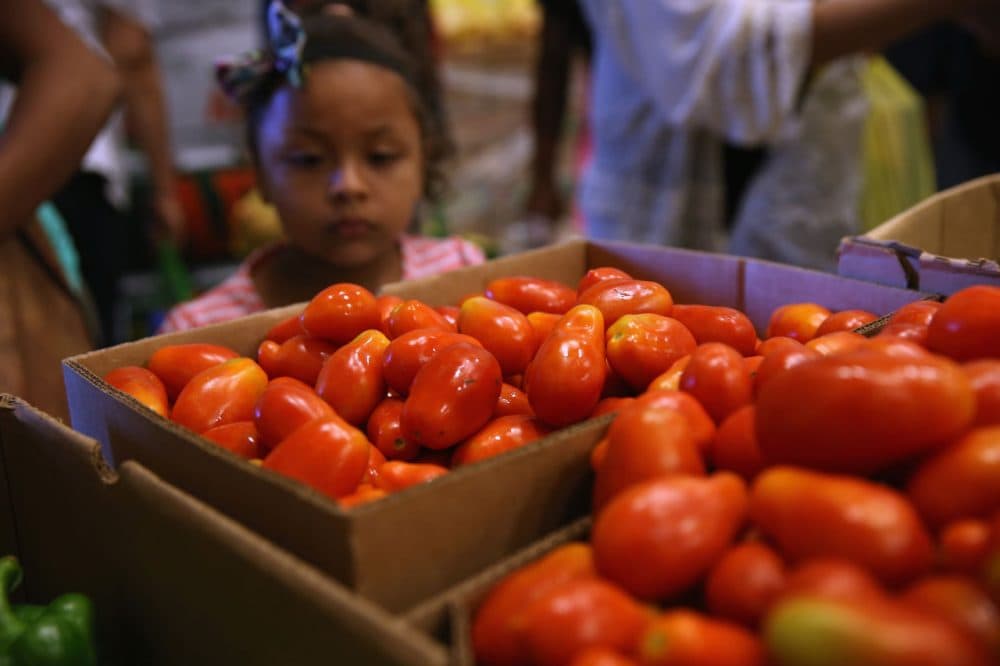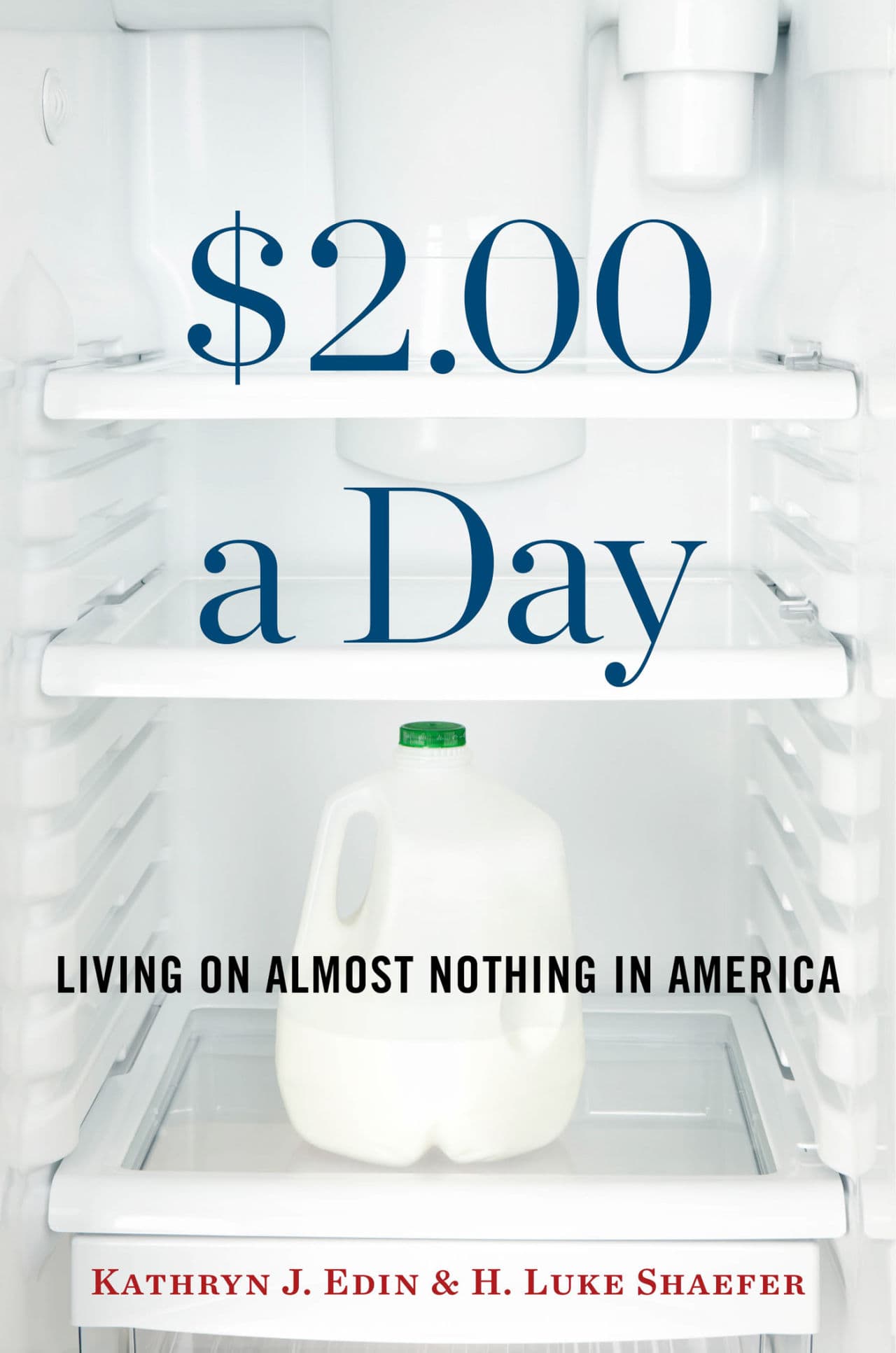Advertisement
Researchers: 1.5 Million U.S. Families Living On $2 A Day
Resume
Raising the minimum wage has been an issue both in the presidential campaign and in protests around the country. But as a new book points out, there are many thousands of households in America where the minimum wage would be a step up.
Kathryn Edin and Luke Schaefer estimate that 1.5 million households - including 3 million children - are subsisting on no more than $2 per person per day. Here & Now's Indira Laskshmanan speaks with the researchers about their book "$2.00 a Day: Living on Almost Nothing in America."
Book Excerpt: '$2.00 A Day'
By Kathryn Edin and H. Luke Shaefer
Chapter 1: Welfare Is Dead

It is only 8:00 a.m., half an hour ahead of opening time, but already a long line has formed outside the Illinois Department of Human Services (DHS) office, which sits on a barren block west of Chicago’s Loop. It is a wet summer morning, one of those odd times when the rain is falling but the sun still shines. People are hunkered down, some shielding themselves from the rain with umbrellas or hoods, others holding sodden newspapers and thin plastic grocery bags over their heads. This two-story, yellow-brick office building—windowless on the first floor—is where those seeking help come to apply for programs such as SNAP and Medicaid. But traditionally it has been linked most closely to the nation’s now nearly moribund cash assistance program, what many refer to as welfare.
Modonna Harris shuffles to the end of the line. A friend, noticing that Modonna had no food in her tiny apartment, convinced her to make the trip. She and her fifteen-year-old daughter, Brianna, have been living in a North Side homeless shelter during this summer of 2012. The shelter provides dinner during the week, and Brianna gets breakfast and lunch through a local nonprofit recreation program, but Modonna and Brianna often go hungry on weekends. The shelter’s residents can usually count on a “guy who drops off some surplus food” from an unknown source, but recently all he’s brought is nasty-smelling milk well beyond its expiration date.
When asked why she hasn’t applied for welfare, Modonna shrugs. Actually, it hasn’t even occurred to her. She explains, “I’ve been through this before, and I’ve been turned down ... They did send me a letter. But they just say, ‘You’re not eligible,’ they don’t explain why.” How could she not be eligible, she wondered, without even one cent in cash income and a child to provide for? Her aunt’s explanation is simple: Hasn’t she heard? They just aren’t giving it out anymore. To Modonna, that seemed as good an answer as any. “I don’t actually know anybody who is getting it. And, you know, when my auntie was saying that, I’m thinking, ‘Okay, well maybe that’s making sense of why I didn’t get it’ ... I’m like, ‘Okay, maybe that’s it.’” Despite her now desperate circumstances, Modonna was deeply reluctant even to go to the DHS office and apply for the cash welfare program. Finally, after much persuasion, she relented.
Much of the time, when you ask for help from the government, you can expect the process to take a long time. First, you wait in line to “get a number.” (In places like Chicago, you have to get to the DHS office early, because the line can stretch down the block even before the doors open.) Once you get a number, you wait for your name to be called so you can see the caseworker and provide the required documentation. Then you go home to wait while they process your paperwork. Finally, if your application is approved, you wait for the mail carrier to deliver your electronic benefit transfer (EBT) card, which works like a bank debit card.
One way the poor pay for government aid is with their time.
Modonna has a proud, even regal, air about her. Her voice is smooth and her diction precise. Her posture is perfect, her dark skin smooth, her smile warm. But most of the other folks waiting in line look to be in rough shape, with worn, dingy clothing, decaying teeth, painful infirmities, and an air of desperation. The kind-looking woman in front of Modonna seems prematurely old. She turns to Modonna and relates how she struggled to get Medicaid for her oldest adult son, desperately ill and then hospitalized with AIDS. Roadblock after roadblock held up the process; months passed and he died—the day before his medical card arrived in the mail. Now she is here again, this time to apply for Medicaid on behalf of her younger adult son, who is also chronically ill and in need of treatment.
Modonna is visibly uncomfortable in this line. She would probably say that she’s one of the people who doesn’t belong here (although you’d perhaps hear that from many of the people in line). Both of her parents worked steadily while she was growing up. She had close to a middle-class upbringing, although it was far from idyllic. Her parents divorced when she was young, and she lived mostly with her unsupportive mother, who suffered from depression. This was better than being with her dad—who was controlling and demeaning. Despite all this, Modonna managed to graduate from one of the better high schools in Chicago and to start college at a decent private university specializing in the arts. But she attended for only two years. With her family unwilling to provide financial assistance, she maxed out on student loans and had to drop out, with a boatload of student debt and no degree to show for it. She left hoping that one day she might go back to complete her degree. But love intervened.
Brianna arrived about a year into Modonna’s marriage to Brian, who had swept Modonna off her feet with his drive to make it in the music production business. He had a dream, and he seemed to be doing the work to make it happen. Yet after a few years, it became painfully clear that he was a pathological liar with an addiction to hard-core porn. He would hide his dirty magazines under the rug and deny they were his. “They must have been here when we moved in,” he’d claim. One time, the family was evicted because Brian just stopped paying the rent and didn’t tell Modonna until it was too late. Brian cheated first, and then Modonna got wrapped up in a turbulent, all-consuming love affair. The marriage broke up about the time Brianna entered the first grade.
Modonna had worked off and on over the years before the marriage ended. Now on her own, she needed a full-time job. With no college degree and a sporadic work record, the best position she could find was a daytime shift as a cashier at Stars Music downtown, a position paying $9 an hour. She would hold that job for the next eight years. Modonna loved the work. “I learned so much at Stars,” she recalls. The mother-daughter pair found a tiny studio apartment in the South Shore neighborhood, near Lake Michigan, and for a while things were good. The two scraped by on a combination of Modonna’s paycheck, a small amount of SNAP, and whatever child support Brian managed to provide. Brianna was doing well in school—she even made honor roll one semester. Modonna felt proud to be the provider for her little family.
Then their apartment building started going downhill, fast. Deferred maintenance became no maintenance at all. Modonna couldn’t handle the “roaches, the size of ... big water bugs,” and the other obvious hazards. She tried to get out of her lease and asked that her security deposit be returned. The tension between her and her landlord escalated, and she ended up calling a lawyer, who requested a list of the building’s code violations from the city. When it came, Modonna says, it was “eight pages long!”
Right when it seemed as if she might win some concessions from her landlord, Modonna’s cash drawer at Stars came up $10 short, and she couldn’t account for it. She was summarily dismissed, given no benefit of the doubt, despite her years of service and the small amount of money involved. “Ten dollars short, and they found it after they fired me,” she says. But no call of apology came, no invitation to return to work.
That’s when things really started to fall apart.
Excerpted from $2.00 a Day: Living on Almost Nothing in America by Kathryn J. Edin and H. Luke Shaefer. Copyright © 2015 by Kathryn J. Edin and H. Luke Shaefer. Reprinted by permission of Houghton Mifflin Harcourt Publishing Company. All rights reserved.
Guests
- Kathryn J. Edin, professor in sociology and public health at Johns Hopkins University and co-author of "$2.00 a Day." She tweets @KathrynEdin.
- H. Luke Shaefer, associate professor of social work and public policy at the University of Michigan and co-author of "$2.00 a Day." He tweets @profshaefer.
This segment aired on November 18, 2015.